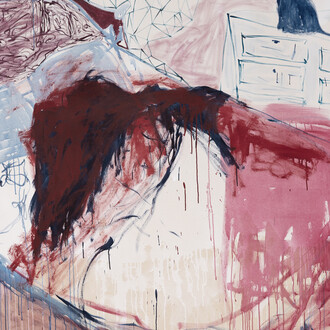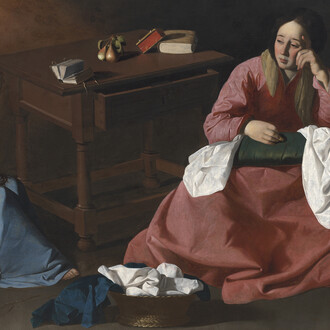The United Kingdom has long had its own metaphorical hall of fame. This hall of fame doesn’t come with a red carpet and there’s only the odd gold gilded frame visible. Instead there is a funny patterned carpet which disguises some questionable stains with biscuit crumbs and the welcoming smell of ‘ahh Bisto’ wafting through the halls. This hall of fame features any Brit who has been dubbed a ‘national treasure’, either by the Mirror or the Sun- aka the ‘people’s’ mouthpieces. It features everything from: the BBC (hanging on in there by a thread), submissive mannerisms (sorry), the nation’s ability to queue for hours, Terry Wogan and Mary Berry make the cut, as does the smell of undercooked batter dominating any seaside town. And so, for his second solo show at the Cob Gallery, Joe Sweeney has delved into this subconscious hall of subliminal fame with a show titled, “Loose Change.”
The show follows Joe through another year nit-picking on England and its ridiculous personality traits. Using mediums ranging from plaster to digital print, textiles and neon, the twenty-something year old artist has produced works with names that sell themselves. Touching on 2016’s ‘5p Gov. bag charge’ law, Sweeney introduces a work called “'Holy Ghost” a collection of plaster 5p bags - an ode to the stubborn lifespan of plastic which will outlive us all and age a lot better for that matter. His penchant for print making and ease with fabric has helped him make a slightly softer, subtler nod to our seaside towns with a hanging piece titled: “We are a portion of everything we’ve ever loved”- a digitally printed greasy chip shop silk banner, that is as delicate as the newspaper you put your fish and chips on after you’ve added too much vinegar. There’s a lot more; nods to a fading masculinity and the macabre yet overly familiar way we deal with icons, the hopes that die with them and our dealings with it.
“Loose Change” can feel somewhat cannibalistic. It’s all encompassing, vying for attention, with every piece aiming to out-shadow one another while packing a punch. It has more layers than that onion you’re chopping for gravy. But what makes his work so great, so appealing and so wet-your-knickers-good, is while on the surface it feels easy to look at, easy to inhale and initially easy to understand, it tells the tale of transgression, social transgression and our struggle with it. I guarantee you’ll never look at a shop sign the same way. Hanging meat wont make you gag and the 5p bag becomes novel not a nuisance.
But don’t be mistaken in thinking this is silly art, all a bit of fun. It oozes emotions that go far beyond a cheap laugh. Solidarity, acceptance, banality and ‘throw-away’ life echo loudly in his work. From Camp to Corner shop, to a man whose life’s legacy is just his Tesco Express receipts. It’s funny yes, easy to chew, yes. But digesting it engulfs you in an unidentified feeling, think hard enough and his work can be uncomfortable to stare at. That’s what makes it so bloody exciting.
It is this despondent, everyday acceptance of the mundane which Sweeney has put a magnifying glass on in “Loose Change.” He says his fasciation of Britain lies in the way “we seem to operate in this realm of melancholy which creates quite a sardonic point of view, it’s hardy and it’s witty. And maybe a sense of morbidity, bolstered by our obsession with nostalgia, which I think particularly reflects our hardwiring as an island nation with tempestuous weather”.
To understand the work, you need to know the artist a bit. Joe Sweeney is quick. He’s quicker than the red arrows or crack head scuttling passed you on their way to score. His humour is a squeeze of lemon juice in a paper cut you didn’t know you had- he’s not mean but my god his euphemisms, puns, jokes and harsh realties are so nail bitingly close to the bone it makes you want to be vegan. Joe is a one-man band, and where there is a fine line between inspiration and obsession, Joe strides over it, sits on top of it and plays with it like a cat does a mouse. He can capture the sights that wander by us daily, unnoticed and forgotten, from seaside Britain in the 70s to “U OK HUN??” millennials of the now, his work is frighteningly of the now with scratchy echo’s of the past too.
“Loose change” does what it says on the tin. It’s exactly like the loose change in your pocket- when you are stripped of everything else, you’ve emptied your wallet, dug deep, what’s left? Sweeney has somehow managed to find the obscene and unseen in the mutinously mundane. “Loose Change” promises to be perverted, perverse, glum but my-jaw-aches fun–and isn’t that ‘effing great?
















